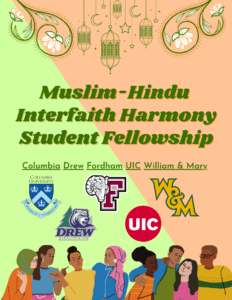In 1972, 90% of Americans self-identified as Christian. By 2022, that number had dropped to just over 60%. While some of that decline is due to disaffiliation, the changing demographics are also due to an increasing number of Americans who identify with other religious traditions. Due largely to immigration and differential birth rates, Islam and Hinduism are now the third and fourth largest religious communities in the U.S., respectively.
Despite the values and cultural heritage that many Hindu and Muslim Americans share, these two communities often remain divided. Most Hindu Americans and a fifth of Muslim Americans trace their roots to South Asia, a region that has experienced a significant rise in religious nationalism and Hindu-Muslim violence.
“Many Hindu and Muslim Americans have immediate family members abroad and have very personal connections to these tensions,” said Nancy Fowlkes, campus fellowship coordinator for Hindus for Human Rights, in a 2023 Religion News Service article. “Often there is a level of discomfort for Hindus and Muslims in the United States with even just the idea of forming friendships with one another.”
Recent survey data supports Fowlkes’ claim. According to a 2021 Pew Research Center study on religion in India, 66% of Hindus and 64% of Muslims see individuals in their group as “very different from” those in the other group. The study also found that Indians tend to affiliate with their own religious group when forming friendships. A 2020 survey conducted by the Carnegie Endowment for International Peace found that just 52% of Indian-born Hindu Americans are very comfortable having close Muslim friends, while only 46% of Indian-born Muslim Americans are very comfortable having close Hindu friends.
These attitudes present significant obstacles when it comes to creating personal relationships between Hindu and Muslim Americans. Because 33% of Hindu Americans and 42% of Muslim Americans are between the ages of 18-29 years old, there is an opportunity for higher education institutions to play a role when it comes to bridging the divide between these two growing religious communities in the U.S.
To promote efforts that encourage dialogue and engagement among Hindu and Muslim student groups, AVDF awarded a two-year $87,000 grant in 2023 to Hindus for Human Rights (HfHR). The Hindu-American nonprofit organization advocates for pluralism, and civil and human rights in North America and South Asia.
“Hindus for Human Rights is well positioned to help Hindu and Muslim American college students bridge common divides. The organization has built strong partnerships with Muslim-American and interfaith associations that have helped them to launch a student-led interreligious leadership program focused specifically on community-building between Hindu-and-Muslim-American students,” said AVDF Director of Programs John Churchill.
 The recent AVDF grant to HfHR supports the Interfaith Harmony Student Fellowship, the first-ever youth-led, national effort focused on building interfaith leadership among Hindu and Muslim students in the United States. The fellowship is a collaboration between HfHR and the Indian American Muslim Council. It has brought together 10 students, five Muslim and five Hindu, to host interfaith events on their school campuses. The inaugural student fellowship includes one individual representing a Hindu student association and one individual representing a Muslim student association from each of the following schools: Drew University, Columbia University, Fordham University, College of William and Mary, and the University of Illinois Chicago.
The recent AVDF grant to HfHR supports the Interfaith Harmony Student Fellowship, the first-ever youth-led, national effort focused on building interfaith leadership among Hindu and Muslim students in the United States. The fellowship is a collaboration between HfHR and the Indian American Muslim Council. It has brought together 10 students, five Muslim and five Hindu, to host interfaith events on their school campuses. The inaugural student fellowship includes one individual representing a Hindu student association and one individual representing a Muslim student association from each of the following schools: Drew University, Columbia University, Fordham University, College of William and Mary, and the University of Illinois Chicago.
The fellows attended the Interfaith America Leadership Summit in Chicago in the summer of 2023 to learn techniques that promote interfaith dialogue and bridge-building. The fellows also participated in additional programming outside the conference to learn specific strategies for engagement between Hindu and Muslim communities.
Following the summer conference and training, the students at each of the five campuses started the process of designing interfaith activities that would promote collaboration and build relationships between Hindu and Muslim student groups during the 2023-24 academic year. Each pair of students received a $5,000 stipend to execute bridge-building initiatives between these two groups on their college or university campuses. Each fellow receives guidance from HfHR leadership and a faculty or administrative sponsor to design and implement their activities on campus. The paired Hindu and Muslim student fellows on each campus will work together to design events that promote engagement between the two faith communities which may include events such as South Asian movie nights, music concerts, academic discussions, and more.
One of the fellows, Manasvi Thumu, a Hindu student from India, was interviewed for a 2023 article published in the Religion News Service. Thumu, a junior at the University of Illinois Chicago, shared that the Indian Student Association and the Pakistani Student Association never met with one another until Thumu planned their interfaith activity.
“The main reason why a lot of us are divided even though we have so many shared cultural experiences and shared identities, is because of the way our parents might think of each other’s religions,” said Thumu in the Religion News Service article. “Once you know each other as people and not communities, you can’t go back.”
For more information about the inaugural Interfaith Harmony Student Fellowship, click here. To read the full feature about the fellowship program in the Religion News Service, click here.
